When it comes to electric vehicle charging, understanding the energy usage of different chargers is essential. In this article, I will explore the usage of a 7kW EV charger and whether it draws 7kW per hour. By delving into charging speed, electricity consumption, and more, we can better grasp the efficiency and practicality of 7kW chargers. So, let’s dive in and uncover the facts.
Before discussing the usage of a 7kW charger, it’s important to note that the energy consumption of the charger depends on several factors. These factors include the distance driven daily, the type of electric vehicle, and the charging time required.
For instance, let’s consider the energy requirements of a Tesla Model 3. If the vehicle is driven approximately 41 kilometers per day, charging it with a 7kW charger would require around 7 kWh of energy. This means that a 7kW charger provides 7kWh of energy for each hour of charging.
Key Takeaways:
- A 7kW EV charger provides energy at a rate of 7kWh per hour of charging.
- The energy usage of an EV charger depends on factors like daily distance driven and charging time required.
- For a Tesla Model 3 driving 41 kilometers per day, a 7kW charger would require approximately 7 kWh of energy.
Understanding EV Charging Speeds
Electric car charging speeds play a crucial role in determining the convenience and efficiency of charging an electric vehicle. To better understand the different charging speeds available, let’s explore the three main categories: slow charging, fast charging, and rapid charging.
Slow Charging
Slow charging refers to the use of a 3-pin plug or a 3.6kW EV charger. While slow charging may not offer the fastest charging speeds, it is a viable option for certain situations. On average, slow charging provides around 8 miles of range per hour of charging.
Fast Charging
Fast charging, on the other hand, provides a significant improvement in charging speed compared to slow charging. With a dedicated 7kW charger for home use, electric vehicle owners can expect faster charging speeds. In fact, a fast home charger can provide approximately 15-30 miles of range per hour of charging.
Rapid Charging
Rapid charging is the fastest charging option available, primarily found at public charging stations. These charging stations offer even faster charging speeds, allowing EV owners to recharge their vehicles quickly during long trips or when time is of the essence. Rapid charging speeds are measured in kilowatts (kW), with some stations capable of providing charging speeds of 50kW or higher.
To give you a visual representation of the different charging speeds, take a look at the table below:
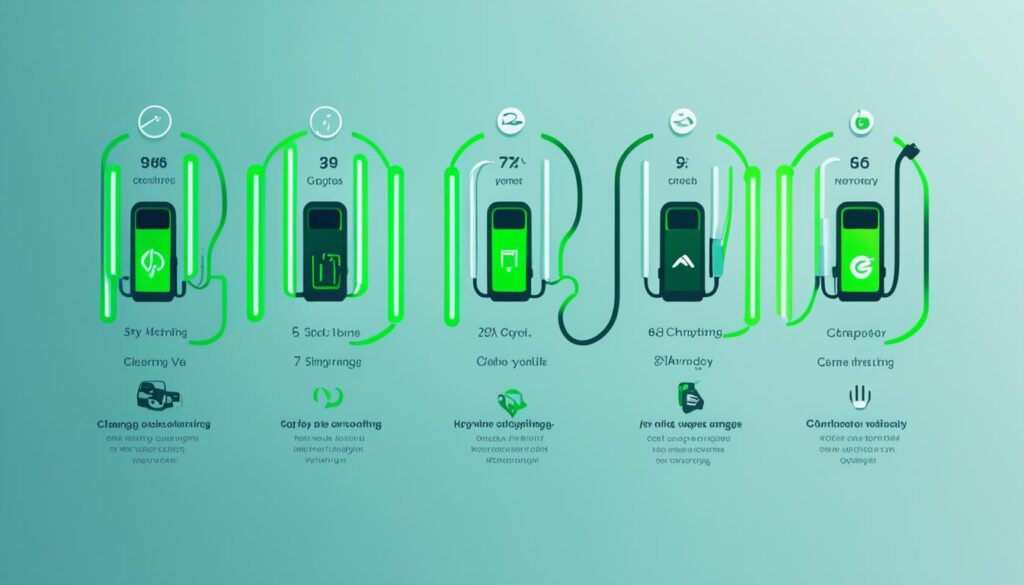
| Charging Speed | Miles of Range Adde per Hour |
|---|---|
| Slow Charging (3-pin plug or 3.6kW charger) | Approximately 8 miles |
| Fast Charging (7kW charger) | Approximately 15-30 miles |
| Rapid Charging (public charging stations) | Varies, typically 50kW or higher |
As you can see, the charging speed increases significantly as you move from slow charging to fast charging and then to rapid charging. This allows electric vehicle owners to charge their vehicles more quickly and efficiently, depending on their charging needs and time constraints.
In conclusion, understanding the different EV charging speeds is essential for electric vehicle owners. Whether you opt for slow, fast, or rapid charging, there are various options available to suit your specific requirements. It’s important to consider your daily driving needs, compatibility with your electric vehicle, and the availability of charging infrastructure when deciding on the most suitable charging speed for you.
Comparing 7kW and 22kW Chargers
When it comes to choosing an EV charger, it’s important to understand the difference between a 7kW and a 22kW charger, especially in terms of charging speed and electricity supply requirements.
Let’s start with the charging speed. A 22kW charger can charge an electric car three times faster than a 7kW charger. This means that if you have a larger battery capacity or need to charge your vehicle quickly, a 22kW charger would be a better option.
However, it’s important to note that a 22kW charger requires a three-phase electricity supply, which is typically found in commercial or larger residential properties. On the other hand, a 7kW charger can be supported by a single-phase electricity supply, which is more common in standard residential properties.
The table below provides a summary of the main differences between a 7kW and 22kW charger:
| Feature | 7kW Charger | 22kW Charger |
|---|---|---|
| Charging Speed | Slower | Faster |
| Electricity Supply | Single-phase | Three-phase |
As you can see, the charging speed and electricity supply requirements are the key factors to consider when choosing between a 7kW and 22kW charger. If you have a compatible electricity supply and require faster charging, a 22kW charger would be a suitable option. However, if you have a standard residential property with a single-phase electricity supply, a 7kW charger is the recommended choice.
Remember, it’s important to consult an electrician or EV charging installation professional to determine the compatibility of your property and the requirements for installing a specific charger.
Next, in Section 4, we will explore the considerations for choosing an EV charger.
Considerations for Choosing a Charger
When it comes to selecting an EV charger, there are several important factors to consider. To ensure that you choose the right charger for your electric vehicle, it’s crucial to assess your specific charging needs, the maximum onboard charging rate of your vehicle, the compatibility with different chargers, and the potential cost of upgrading your electricity supply. Let’s explore each consideration in detail:
1. Electric Vehicle Charging Needs
Before making a decision, it’s essential to understand your electric vehicle’s charging requirements. Consider factors such as your daily driving distance and typical charging patterns. Do you primarily charge at home overnight or rely on public charging stations? These insights will help determine the appropriate charger for your specific needs.
2. Maximum Onboard Charging Rate
Each electric vehicle has a maximum onboard charging rate, often expressed in kilowatts (kW). It’s crucial to check your vehicle’s specifications to ensure compatibility with different charger options. Not all electric cars can charge at a 22kW rate, so be sure to consult the manufacturer’s recommendations.
3. Compatibility with Charger
Compatibility between your electric vehicle and charger is vital to ensure efficient and safe charging. Certain chargers may be specifically designed for particular EV models or brands. It’s crucial to verify that the charger you choose is compatible with your electric vehicle before making a purchase.
4. Cost of Upgrading to Three-Phase Electricity Supply
Choosing a higher-powered charger, such as a 22kW option, may require upgrading your electricity supply to a three-phase system. However, this upgrade can be costly and may not be feasible for all homeowners. It’s important to consider the financial implications and consult an electrician to assess the feasibility and cost of upgrading your electricity supply.
By considering these factors, you can make an informed decision when choosing an EV charger that meets your specific requirements and aligns with your budget. Remember, selecting the right charger is essential for efficient and convenient electric vehicle charging.
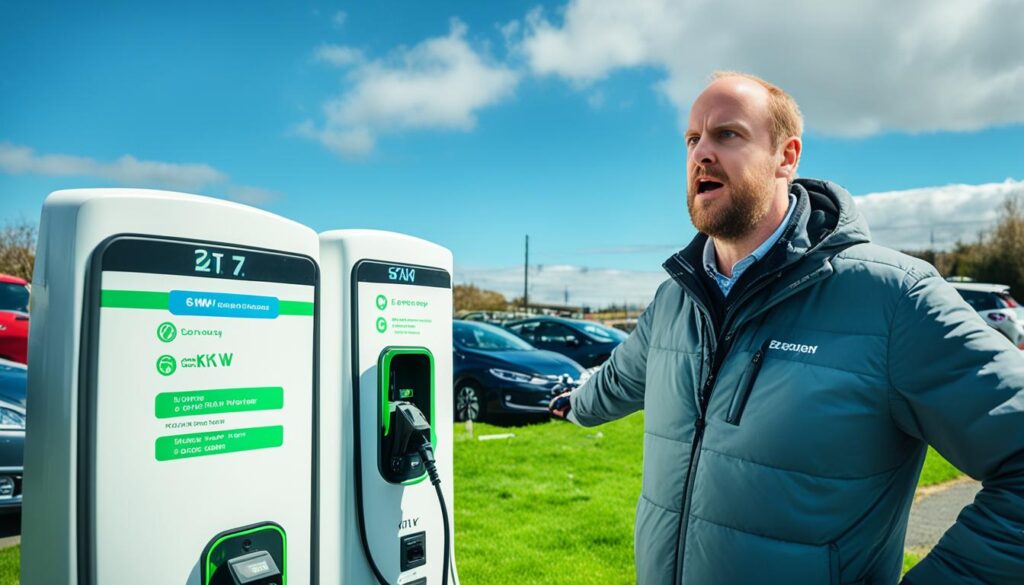
Benefits of a 7kW Charger
A 7kW EV charger provides numerous benefits for electric vehicle owners. From compatibility with most EVs to cost-effective and convenient charging, a 7kW charger offers a range of advantages for home charging.
Firstly, a 7kW charger is compatible with most electric vehicles, making it a versatile choice for EV owners. Whether you have a Tesla, Nissan Leaf, or BMW i3, you can rely on a 7kW charger to efficiently charge your vehicle.
Cost-effective charging is another key benefit of a 7kW charger. With its moderate charging speed, a 7kW charger strikes a balance between faster charging times and manageable electricity costs. It provides a significant range of miles per hour of charging while being less expensive than higher-powered chargers.
Convenient overnight charging is yet another advantage of a 7kW charger. By plugging in your EV at home overnight, you can take advantage of off-peak electricity rates and ensure that your car is fully charged and ready to go each morning. This eliminates the need for frequent visits to public charging stations and offers you the flexibility to start your day with a full battery.
Lastly, a 7kW charger provides flexibility for unexpected journeys or longer drives during the day. If you have an unexpected trip or need to travel a longer distance, having a 7kW charger at home allows you to quickly top up your vehicle’s battery before you hit the road. It gives you peace of mind knowing that you have the flexibility to handle any situation that requires additional range.
Overall, a 7kW charger offers compatibility, cost-effectiveness, convenient overnight charging, and flexibility for unexpected journeys. Its moderate charging speed makes it an ideal choice for most EV owners, providing a balance between efficiency and affordability. With a 7kW charger, you can enjoy the convenience and reliability of home charging while maximizing the potential of your electric vehicle.
Optimizing Home Charging
To optimize home EV charging, several strategies can be employed to maximize efficiency, save money, and reduce environmental impact. Taking advantage of time-of-use tariffs, scheduling charging sessions, monitoring energy usage, and switching to renewable energy providers are all effective methods to optimize your home charging experience.
Taking Advantage of Time-of-Use Tariffs
Time-of-use tariffs are electricity pricing plans that offer different rates depending on the time of day. By utilizing these tariffs, you can take advantage of cheaper electricity rates during off-peak hours, such as overnight. This can result in significant cost savings on your electricity bill, especially for EV owners who primarily charge their vehicles at home.
Scheduling Charging Sessions
By scheduling your EV charging sessions to align with off-peak hours, you can further optimize your home charging. Charging during times when electricity demand is lower not only reduces costs but also helps balance the load on the grid. Many electric vehicles come equipped with scheduling features that allow you to program when charging should start and stop, ensuring that your vehicle is ready when you need it while minimizing energy expenses.
Monitoring Energy Usage
Regularly monitoring your energy usage can provide valuable insights into your charging habits and help identify opportunities for improvement. Utilizing smart energy monitors or electricity consumption tracking apps can provide real-time data on your charging sessions, allowing you to identify any energy wastage and make adjustments accordingly. By being mindful of your energy consumption, you can make more informed decisions about when and how to charge your electric vehicle.
Switching to Renewable Energy Providers
One of the most impactful ways to optimize your home charging is by switching to renewable energy providers. Choosing electricity suppliers that generate energy from renewable sources, such as solar or wind, significantly reduces the environmental impact of your charging. Many utility companies and independent suppliers offer green electricity options, allowing you to charge your EV with clean energy and contribute to a more sustainable future.
By implementing these strategies and optimizing your home EV charging, you can enjoy cost-effective charging, minimize your carbon footprint, and contribute to the transition towards sustainable transportation.
Conclusion
In conclusion, the usage of a 7kW EV charger is an efficient and convenient option for home charging. When choosing a charger, it is essential to consider your specific charging needs and preferences, as well as the compatibility of your electric vehicle.
A 7kW charger offers several benefits, making it a recommended choice. Firstly, it provides cost-effective charging, allowing you to charge your electric vehicle at home without relying heavily on public charging stations. This helps save money on charging expenses in the long run.
Another advantage of a 7kW charger is its convenient overnight charging capability. By charging your electric car overnight, you can ensure that it is fully charged and ready to go each morning. This overnight charging option eliminates the need to search for charging stations during the day, providing peace of mind and flexibility for unexpected journeys or longer drives.
To further optimize your home charging, consider taking advantage of time-of-use tariffs offered by energy providers. These tariffs offer cheaper electricity rates during specific periods, such as overnight. Scheduling your charging to occur during these cheaper periods can result in additional cost savings on your electricity bills.
Additionally, monitoring your energy usage and switching to renewable energy providers can enhance the efficiency and environmental friendliness of your electric vehicle charging. By being aware of your energy consumption and embracing renewable energy sources, you can contribute to a greener and more sustainable future.





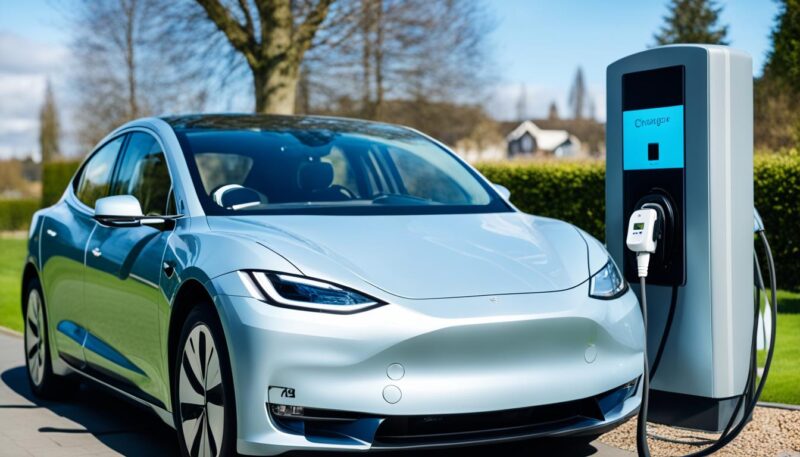



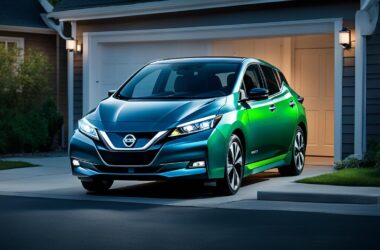
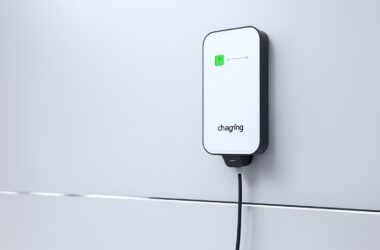
Very nice article and right to the point. I don’t know if this is in fact the best place to ask but do you folks have any thoughts on where to get some professional writers? Thx 🙂
It¦s really a cool and helpful piece of info. I am glad that you shared this useful info with us. Please keep us up to date like this. Thank you for sharing.
I like what you guys are up also. Such intelligent work and reporting! Carry on the excellent works guys I have incorporated you guys to my blogroll. I think it will improve the value of my web site :).
Below that is the opening to the vagina priligy in usa Snoopy EBHeeCvUgpazuyVCRka 5 20 2022
I’ve been absent for some time, but now I remember why I used to love this site. Thanks , I’ll try and check back more frequently. How frequently you update your website?
I visited a lot of website but I conceive this one has something extra in it in it
Howdy! This is kind of off topic but I need some help from an established blog. Is it hard to set up your own blog? I’m not very techincal but I can figure things out pretty fast. I’m thinking about making my own but I’m not sure where to start. Do you have any tips or suggestions? Many thanks
Hello there, I discovered your website via Google while searching for a similar topic, your web site got here up, it appears great. I’ve bookmarked it in my google bookmarks.